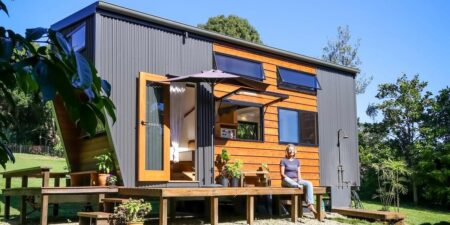This “as-told-to” essay is based on a conversation with Vivian Chu, 38, cofounder and Chief Innovation Officer of Diligent Robotics. Diligent builds robots that can automate tasks within a hospital. This essay has been edited for length and clarity.
I wanted to start a company. That was a road that I actually thought more about than kids, actually.
I ended up starting Diligent Robotics first, then doing the next step — starting a family.
My wife and I have two little ones at home. Our oldest is two years and seven months, and our youngest just turned 10 months.
My wife gave birth to our first, and I gave birth to our second. She was like, “Nope, it’s your turn.”
Thinking in bigger timeframes
Before kids, I was pretty regimented. I had my gym days, my lunch routines, and long stretches of heads-down work. Parenthood changed that.
I still believe in balance, but not on a 24-hour scale. I can’t remember where I heard this, but balance depends on the timescale you’re looking at.
If you expect to have a balance within the timescale of a single day, that’s probably unlikely. But if you stretch it to a week, a month, or a year, then it makes more sense.
I think about balance as extending the timescale, looking at it over a longer window. That’s how I make sure I still spend quality time with my family. Before, I could look at a 24-hour day and decide how many hours I would spend on exercising or work.
You just can’t do that anymore.
Breast-pumping provides some daily structure
My smartwatch wakes me up at 6 a.m. I start the day really quickly by checking on Slack and email. We run a 24/7 business, and hospitals need to check if anything has come in.
I get up at six so that I can quickly get set up as a mother of a 10-month-old, still breastfeeding, and do my first pump of the day.
The annoying thing about breastfeeding is that I’m trying my best to watch my caffeine intake. I make a weird half-coffee, half-decaf, half-regular mix every morning, so at least I get some caffeine. No way I’m getting through the day without it, but it’s a little bit more diluted.
I aim for every three to four hours between each pump, or else I start to worry about having my supply drop and not having enough milk for my little one.
It’s created an interesting structure where I can schedule meetings, have meals, and so on, within these blocks of time.
While I’m pumping, I usually use that time at my desk, going through emails and working on tasks.
One really random thing that I’ve picked up, because breastfeeding just takes so much energy, is that every night around 9 p.m. I’m eating a late-night snack, which I’ve never done before. I try to do a plain Greek yogurt with fruit and a pack of peanuts mixed in. Something that’s high protein and relatively low sugar.
At 9:30 p.m., I hop back onto my work computer to check on any last-minute or crucial items that have come in.
I use this time to plan out critical tasks for the next day, make sure that my pump sessions that I’ve outlined, I have those blocks because meetings come in and out, and I have to shift them sometimes.
Then I do one final pump again at 10:30 p.m.
One ‘stupid gripe’ that says a lot
It’s been a very different experience being the birth parent. I had a routine with our first child, but this is new. It’s shown me how we still need to have more conversations around navigating motherhood, including logistics like how to prep for a business travel, what equipment you need to bring, or how the first trimester can be really hard.
This is actually a stupid gripe that I’ve had, and it’s how I’ve gone to many conferences where I’ve had to figure out how to pump, and I’m flabbergasted at how few have thought about this.
I was at one conference with 2,000 attendees, and not one had a mother’s room. I had to go into the bathroom and stand there for 20 minutes.
There was only one conference — the Bezos Mars Conference — that did such an amazing job, where they had a separate mother’s room, and it would livestream the event. You didn’t miss out on key sessions, so they were super thoughtful about it.
I’ve also discovered that airport mothers’ rooms are fantastic, and I’m very glad that those are actually in good shape.
This is part of the reason I think we should be having more of this conversation — to raise awareness about the challenges faced by parents and the services we need to provide.
It really does take a village
Having a support system is crucial.
We have two part-time nannies, not because we need both of them at the same time, but because if one gets sick, we won’t end up with no nannies.
We are also amazingly lucky that my parents and the kids’ grandparents are very involved. They will come and stay with us for months at a time.
Still, there are days when there will be no one left to call, and you have to prioritize.
I was talking to another colleague who has kids, and he said, “Yeah, I have these lifelines, and I pull each one. And last week I pulled all of them, and I had no more. So I could not go and meet with that investor.”
There will be those times when that happens.
It’s never the perfect time to start a family
I have actually been very lucky to have some fantastic mentors in my career and in my graduate career. And I remember one piece of advice that distinctly stood out from my cofounder, who was also my Ph.D. advisor.
She said, “It’s like there’s never a perfect time to start a family. There will always be life situations. There will always be something that seems like now is not the right time, and so you should do what is best for you, and things will work out.”
And I’ve always kept that in the back of my mind, so while I knew that being a founder would be hard, I knew that we would make it work.
Read the full article here
















